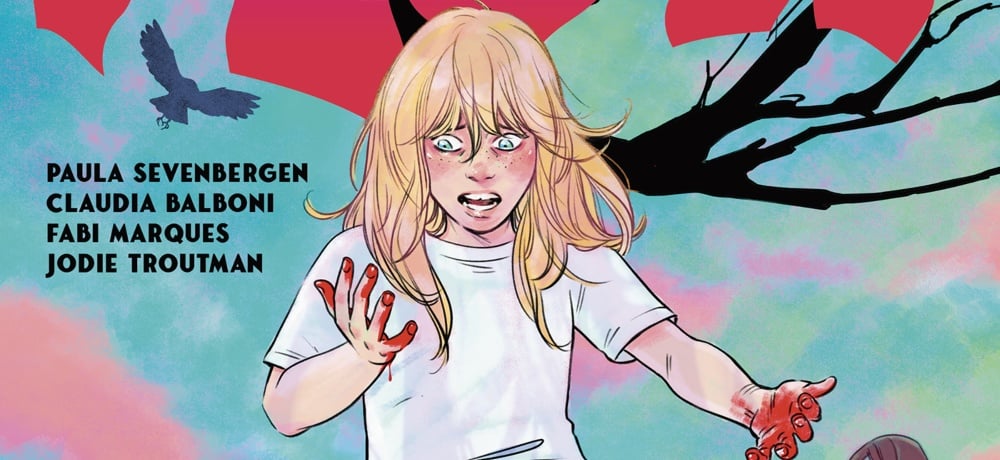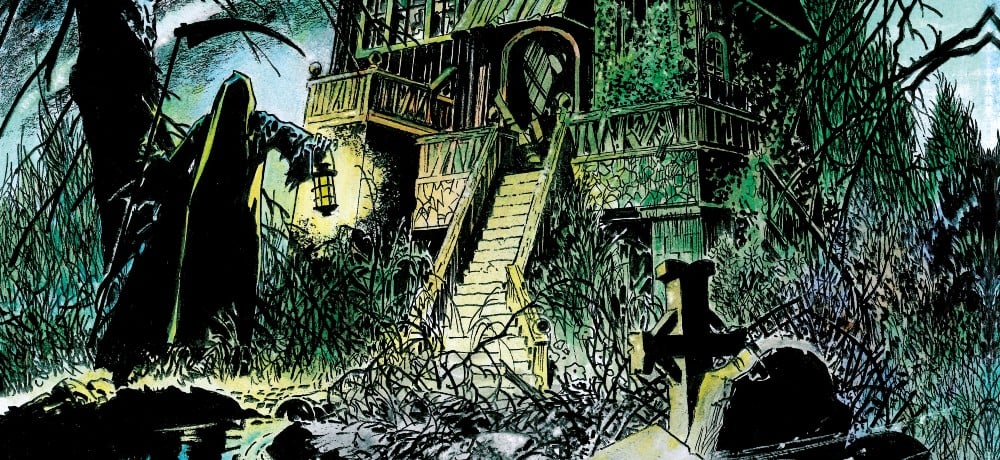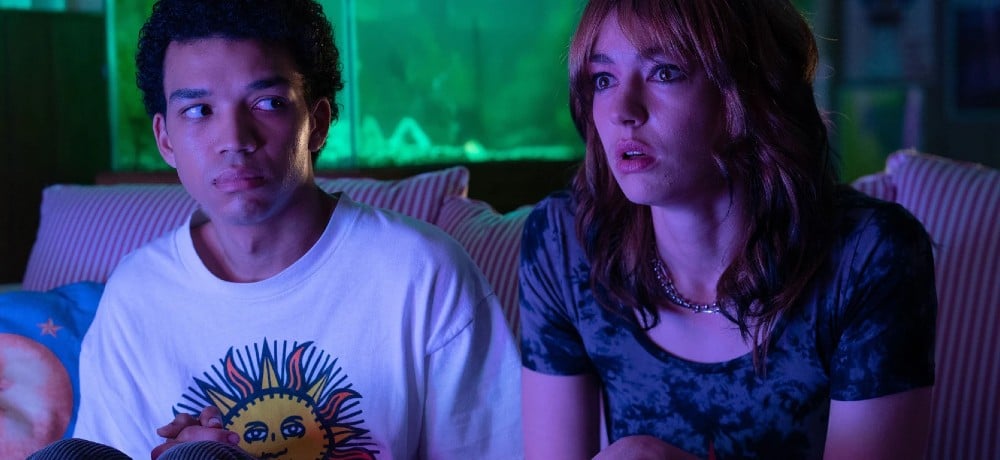






I wasn’t in the overwhelming camp of critics enamored by Jane Schoenbrun’s We’re All Going to the World’s Fair. I don’t say that to brag or even scold, but to set proper expectations as you read this review of I Saw the TV Glow. Schoenbrun’s style of borderline mournful listlessness has the structure of a neon daydream, which is fluttery and ethereal in ways that align with arthouse styles that are not meant to please all audiences. I Saw the TV Glow cements Schoenbrun’s cerebral and sobering lullaby style as a recurring signature, which I appreciate more this time. Schoenbrun understands and conveys the anxieties of existence so bluntly, albeit tuned to its own unique static-hazy frequency.
Justice Smith stars as suburbanite Owen, who we accompany through decades of his life. As a child (played by Ian Foreman), he became obsessed with a supernatural young adult television program called “The Pink Opaque.” Owen isn't allowed to stay up past his bedtime to watch what his father (I spy Fred Durst) mocks as a “girl’s show” live, so he lies about sleeping over at a friend’s to catch new episodes with older superfan Maddy (Brigette Lundy-Paine). Over the years, The Pink Opaque brings Owen and Maddy together, helping both feel less alone — until Maddy vanishes, leaving behind only a flaming television set.
The universality of Schoenbrun’s existential crisis unleashes through Owen, a timid and fearful boy who grows to be another hometown anybody. The Pink Opaque offers Owen everything he wants: an escape, a connection, and a fantasy outside domestic issues that plague his and Maddy’s childhoods. At face value, I Saw the TV Glow is an ode to the children raised by studio programming because parents were either busy or neglectful, which Schoenbrun depicts with empathy. Owen can’t avoid his mother’s health scare (played by Danielle Deadwyler), nor can Maddy ignore their nose-breaking stepfather. Schoenbrun addresses the role screens play in kids’ lives when their parents cannot capably or appropriately provide guidance, as depressing and sorrowful as mortality may be.
Then there’s The Pink Opaque, a monster-of-the-week episodic starring Isabel (Helena Howard) and Tara (Lindsey Jordan) as they try to defeat the main villain, Mr. Melancholy (Emma Porter). Two girls connected by glowing pink ghost tattoos on their necks defeat sinister ice cream cones or confront the “Scar Wash” with a Charmed or Buffy the Vampire Slayer feel, complete with entire scenes we watch as if we’re on the couch with Owen and Maddy. Schoenbrun develops deep enough lore to make The Pink Opaque believably real, from silly creature costumes to Mr. Melancholy’s two cronies, Marco & Polo, complete with heavy cosmetics that mimic their boss’ cratered moon surface exterior and gel-crusted hairstyles that curl in half-crescent shapes. Schoenbrun understands that for Owen and Maddy to be so invested in The Pink Opaque, we also have to recognize the show’s appeal, and there is a comforting syndicated cable draw about the clips. It’s supposed to be low-budget and corny — did you ever try to rewatch old-school Power Rangers?
As Owen’s existence hurdles by, Schoenbrun levels their greatest commentary; the show ends, and Maddy’s disappearance perhaps gets resolved. I Saw the TV Glow is ultimately a movie about time — how we contemplate and waste it. It’s also about finding oneself or ignoring buried urges to reject conformity and trust ourselves. Owen’s and Maddy’s choices to leave their mundane routines behind or double down on staying trapped within small town borders is an incendiary commentary about how “there is still time” (as chalk drawings on pavement roads read thematic relevance underfoot).
Look further and you can embrace even more personal reflections from Schoenbrun, who found strength and beauty in the change that Owen fights or, worse, flees from. There’s so much helplessness behind Owen’s breakdown while singing “Happy Birthday” to an arcade party room or his monotone narrations about each advancement in his life, as thrilling as switching professions from a rural movie theater to the equally monotonous “Fun Center.” Schoenbrun’s storytelling is aughts-coded poetic (shout out to Fruitopia), visuals border on the uncanny, and usage of sound design accentuates moods either by amping television-set sounds or letting Alex G’s score breathe (when not pressing mute to make us sense Owen’s desperate, lonesome ache).
That said, I Saw the TV Glow is still a slower, heady burn that no doubt delivers a gut punch of an emotionally climactic last third, yet saunters through some lulls along the way. So much of the film is conversational, hanging on words and pauses that sell the characters' unspoken traumas. There’s emphasis behind their internal reckonings when evaluating their lives versus their dreams. Still, the film can lean too hard into weightless deliveries — not in impact, but cloud-like movement. It’s meant to allow time for thematic digestion, even when there’s not much to chew. There’s plenty to praise about Justice Smith’s performance as Owen’s alienated meekness develops beyond psychology and into physical traits, as well as Brigette Lundy-Paine’s skittish and misunderstood vagabond who’s probably described by peers as “different” behind backs — lulls are more pacing issues.
Then again, Schoenbrun’s restraint may be what others value above all other techniques.
I like I Saw the TV Glow, a melancholic dedication to a generation raised by surreal television unrealities and suburban decay. Let me make that clear. Whatever issues this review takes with execution and pacing do not discredit how the last act made me recoil in solidarity with Owen, especially an arresting final few minutes. Movies are entire journeys, and Schoenbrun won me over as storytelling swells into a semisweet mixture of crushing human unknowns and stress-inducing imagery. Schoenbrun found the confidence to make something so personally revealing, which is a gorgeous tool for a filmmaker whose projections can help others feel less alone. I Saw the TV Glow is one of those experiences that will speak directly to specific viewers, like Schoenbrun is holding their hand through it all, and star ratings be damned, that’s the true mark of a filmmaker who has my attention no matter what comes next.
Movie Score: 3.5/5